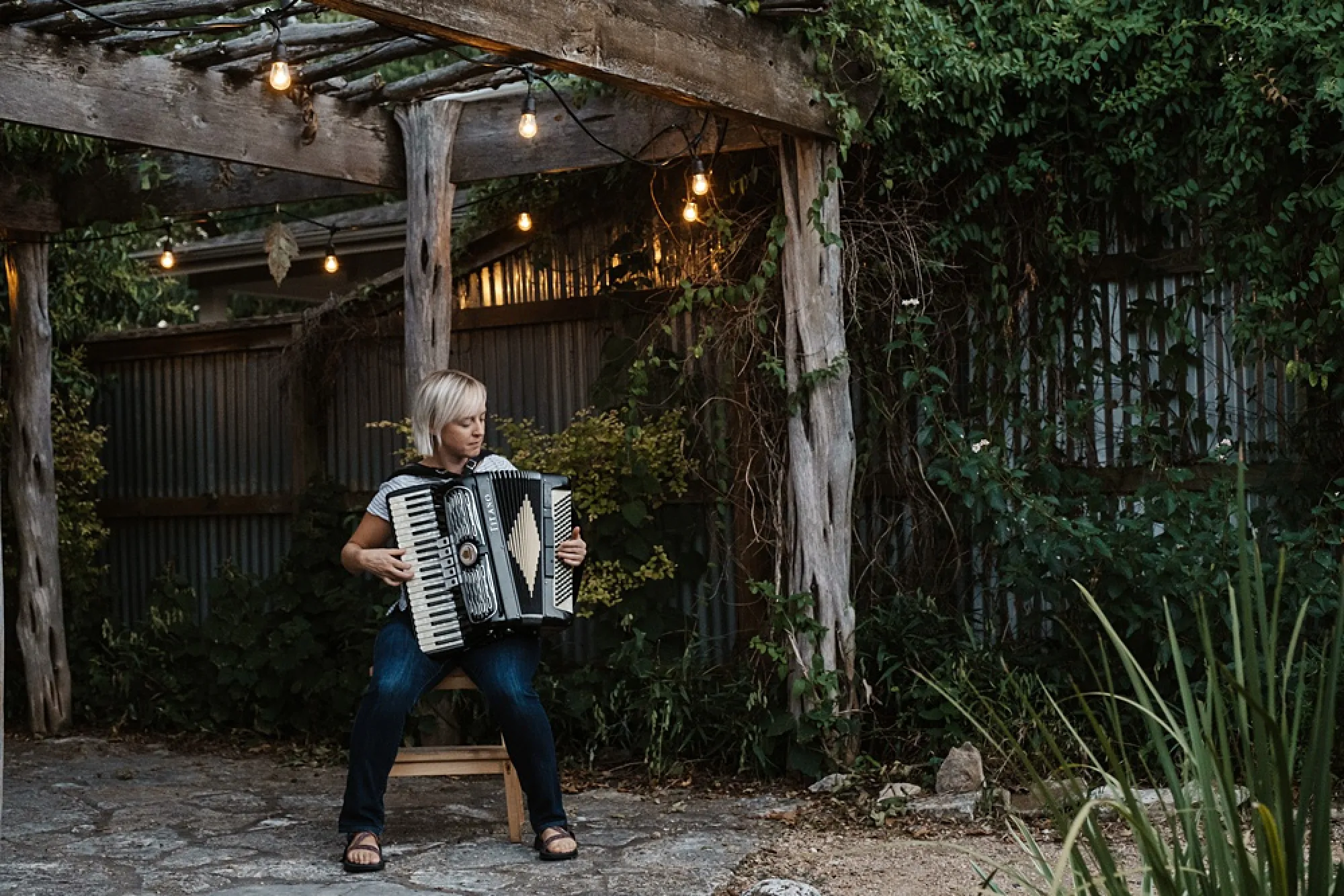September 16, 2020

Dr. Chelsea Burns’ research focuses on Latin American modernisms; bluegrass, old-time and country musics; popular music of the Americas; and the historiography and pedagogy of music theory. In this interview, we talk more deeply about her writing process, recurring themes in the genres of her expertise, and why it’s important to shift our vision of the Canon in musicology.
Burns joined the Butler School of Music faculty in the 2019-2020 academic year, and she serves as assistant professor of music theory. For context, this interview was conducted before the COVID-19 pandemic led to a shift to online teaching as well as travel prohibitions in higher education around the world.
What is your style when researching? Do you have rituals?
I always start with something that caught my eye in another context. Something I read, or something I listened to---anything that seemed to contain more under the surface. At that point, I usually spend a lot of time with the music, as well as with the surrounding material. When was it written? For whom? And why?
I then alternate between writing and researching as needed. As I write, so many questions arise, so I go back and forth a lot to form an argument.
And what is your pace like? I know some people just fall into holes and they're not socially heard from until a piece is completed. Other people, they do a little work every weekend until they find that they’ve made their way. Where do you fall on that spectrum?
Oh man. It's really hard to fit it into small pieces! I think that's one of the most challenging things about being a professor, this balance. Your teaching could take up your whole time if you let it. Or your research could take up your whole time if you let it.
I still am struggling to find that balance. I'm not good with a daily writing practice. I tend to say to myself: “Okay, I have a certain number of weeks to just research.” And I'm really in there doing it but, inevitably, I have to step away and come back.
[Being a professor and researcher] are really contradictory roles and mental tasks. I can't teach in the morning, and then go do research in the afternoon. They both take everything from me.
Do you think people that don’t teach appreciate how many hours go into preparation for class? The hours that help you seem really casual when you walk through the door and begin a lecture?
[laughs] Yeah...no. I don’t think so. In fact, my best example of this was a conversation with my hairstylist. She said, “I have a friend that’s got a great job. She only works about six hours a week. And I thought, “Oh no, I know what that job is…”
[laughs] You just become an expert and know everything by heart, forever…
...and then you just go into the class and talk!

Going back to research, how is music theory research different from other areas in academia? How does the auditory and sometimes visual nature of the work that you're referencing challenge you as a writer?
Oh, a lot, a lot. I feel that it’s particularly challenging if you're doing analysis in context: What's important to say about this piece and why? You're completing a double task in some sense. You need to do a thorough musicological study of it. You need to know the context. You need to know the history. You need to understand the artist’s other works. Then, the analysis needs to weave in there!
Those are all really different tasks. The challenge is to write compelling music analysis, because it's very easy to write things like: “D flat later resolves to the C natural which is delayed until measure 45 when the F sharp chord…”
I'm wondering if, because you're trying to describe something that's so ephemeral and personal at times too, you find it's necessary to personify instruments or sounds?
I feel like it's necessary for me to personify. Or, at least, make visible my personal perception.
There’s a general shift in academia—and music is a little bit behind on this—in which we’re trying to question our assumptions. Who do we assume the listener to be? What if it’s not that person? It’s important to be more inclusive and less universalizing. There are cultural things that lead one person to listen to something as a sad song and another person as a happy song.
What is your basic elevator pitch regarding your personal research interests? If you had to briefly tell someone what your areas of expertise are and how they connect, what would you say?
Broadly speaking, I have two areas of research; one is Latin American modernist composers from Mexico and Brazil in the 1920's, 30's and 40's, and the other is bluegrass and country music. For me, there are a couple of unifying concerns between the areas. First, I’m an Americanist. And I also tend to think about what might be referred to as peripheral repertories, which is a problematic term; these are the politics of how we treat music that is not in the center of the Canon, right? So, I think about what it is to be a responsible analyst of that music, and to try to make an intervention into the field of music theory on that front.

Naturally, you frequently explore themes of race and genre crossover. In forthcoming research you specifically reference Lil Nas X's “Old Town Road” and the distancing that mainstream country music quickly enacted after its release. And recently, Tyler the Creator criticized the Grammys for corralling his music into the category of rap based on his race, asking “Why can't we just be pop?”
Is American music simply more genre-bending in 2020, or is this very old, very familiar genre gatekeeping?
That's a complicated question. I think that part of what's going on, absolutely, is a generational difference. And the Grammys television viewership keeps dropping, and so does Grammy Award power.
That said, man, if you listen to Tyler the Creator, it isn't rap. It's not anything close to rap, right? So, there are these ways in which the Grammy Awards have a slot they put people into. I think that they suffer from the same problem as the Academy Awards. It’s the older, white male perspective. When you watch these award shows, it's palpable.
But this was also happening in the 1920s, with radio categorizing music into hillbilly music or “race records,” and this evolved to be the divide we see between country and R&B. I'm not sure we are more genre-fluid than we were 30 years ago, but do think that we're increasingly aware of the ways in which those borders are weird and problematic.
With regard to languages, you are fluent in English, Portuguese, and Spanish...
And I also speak some German. It was required to study three languages by the program I came from; I was really grateful for that. There's a lot of debate, currently, about whether foreign languages should be required in graduate school, whether that's exclusionary or elitist, but I think—and this may sound like a conservative take—that it opens up a world of scholarship to you that is not otherwise available.
Given that you've written about Brazilian music, do you find that most of the relevant scholarship is written in Portuguese?
Yes. Yeah, there is some scholarship in English, but…I mean, it’s partially because it's this “peripheral repertory”. People in Brazil know it very well, but people in the US barely know it.
It means, too, that if I want to talk to an American audience about this music, I have to do a lot of setup. Once, I was talking to a friend of mine about this, and she said, “Oh, but everybody has to do some lead-in [before a lecture].”
And I said, “Yes, but I remember giving a talk about Carlos Chávez…”. She replied, “Why would you give a talk about Carlos Chávez?” She was confused because she was thinking of César Chávez. So, even though she is professional music theorist with a Ph.D., even though Carlos Chávez is the most famous Mexican composer, I couldn't assume anything.
An interesting idea that you explore in one of your research pieces is that musicians might continue to play instruments with constraints that are not necessary in their situation to recreate an iconic musical moment, or to meet a listener's expectations of the instrument. This reminded me a lot of quilting in that it's originally an art of “making do” that later became its own aesthetic preference. Is this a somewhat unique occurrence in music, or do you run across it all the time?
All the time. In fact, I read something recently about Django Reinhardt-style performers; some of them will perform with just two fingers, just because Django had only two functioning fingers on his left hand. And in bluegrass, there's so much concern about replication. You know how you might buy an older banjo or a certain make of guitar? My partner got a 1957 Martin D-18— people love to play it just because it can replicate the exact solo somebody played.
Bluegrass banjo players quote Earl Scruggs solos all the time, or will even play an iconic solo note for note. Just like it was played in the ’40s or ’50s! So it’s a pretty common phenomenon, not unique to any single practice.

You're planning to conduct research in Summer 2020. Any hints about what you're pursuing?
Yeah. I'm working on these pieces that Carlos Chávez and Silvestre Revueltas wrote in the 1920s, 30s, and 40s.
Some of the pieces, Carlos Chávez wrote for the Museum of Modern Art as part of an exhibition in 1940; it was supposed to celebrate 20 centuries of Mexican music. He wrote a piece in the style of the 16th century, and some in an indigenous style. And Revueltas actually lived in Austin for a while, and was at St. Edward's – they have some of his materials archive. So I'm excited to see what’s there.
Lastly, as a professor you see a great deal of research from green academics. What are some common traps that novice researchers and writers fall into, and what would be your advice to avoid them?
Probably the most common trap is being concerned with seeming smart enough or competent enough. What's it called? The thing that everybody has in graduate school?
Oh, imposter syndrome!
Yeah, right! Having imposter syndrome, and attempting to counter that feeling...
People often write in a way to sound complicated or erudite, when the ability to say what you want to say in a clear, accessible manner is so much more valuable; it will allow you to speak to more people.
Visit Burns' faculty profile for recent publications and press.

